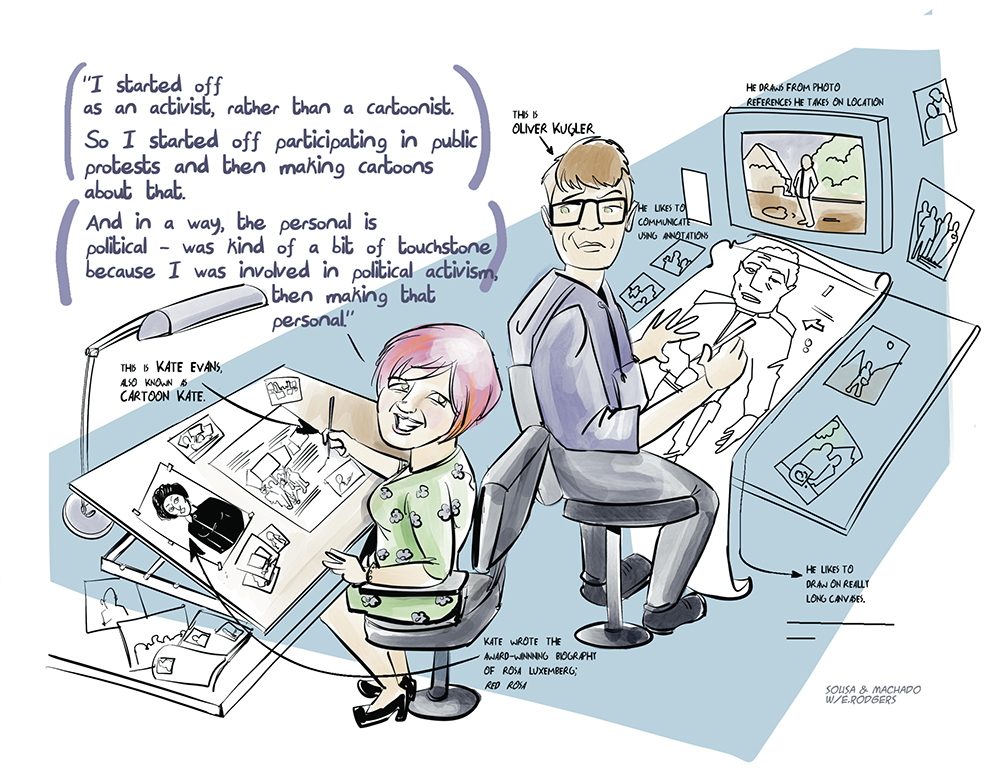What would you want most, if you were arriving in a foreign land, without possessions, a home, or an understanding of the culture?
Let’s extend refugees the same kind of welcome that we’d like to see if the positions were reversed. Here are some ideas to start with.
Click any of the images to see them at a larger size.

PUT OUT A WELCOME MAT
Let refugees know that they are welcome.
Befriend them, give them a friendly smile, put a poster up in your window (or that of your workplace), donate clothes and toys.
You may even consider fostering or sharing your home with those who need a roof over their heads.
Image by Karrie Fransman

START A COLLECTION
Consult the websites of migrant aid charities and food banks to see what kind of food is needed — usually dried or tinned goods.
Then ask your neighbours to help you collect them. Allocating one type of food to each street in your neighbourhood can be good — and then the competitive instinct kicks in as you see which street can come up with the most.
Image by Fumio Obata

HANG UP A WELCOME SIGN
If you own a business or work somewhere public, display a sign to make it clear that everyone is welcome.
In Portland, Oregon, USA, the Independent Publishing Resource Center made signs that read: We welcome ALL races,ALL religions, ALL countries of origin, ALL sexual orientations, ALL genders. We stand with you. You are safe here.
If you’re a maker, you can produce something similar — and make them available to others. Offer them via social media, using your local hashtag, Facebook page or message board.
Image by Sally-Anne Hickman

SUPPORT A FAMILY
Could you help a family who are new to your country?
In the UK, groups can become ‘Community Sponsors’: “you will be allocated a family fleeing conflict, and it will be your responsibility to support the resettled family from the moment of arrival in the UK.”
Other countries have similar schemes — check your local council or national government website for details.
Image by Karen Rubins

QUESTION THE NARRATIVE
It’s a really good, if somewhat cynical, habit to get into: ask yourself what forces or agendas are behind the news.
Every story can be presented in a variety of ways. If you believe that output is being swayed by forces that aren’t entirely neutral, call it out.
Teach your children to do the same (that part’s easy — just shout at your TV or radio every night).
Image by Landis Blair

BROADCAST
Radio and podcasts are a great way to get your message across — right into people’s ears!
It’s one of the most direct, and intimate forms of media.
Is there a community radio station near you, and would they accept, for example, a programme full of refugee voices? In Brighton UK, RadioReverb does just that, hosting Refugee Radio.
No stations in operation? Time to set up your own. Why not?
Image by Michi Mathias

EMPLOY THE LESS EMPLOYABLE
Could you give a job to someone who would find it hard to secure work elsewhere?
Consider recruiting from groups such as ex-convicts – giving them less reason to return to a life of crime – or those with autism, learning difficulties or disabilities, allowing them a chance for paid work that few others may offer.
Image by Wallis Eates

PUT THE PRESSURE ON
Tell your MP or other representative what you expect them to do about the issues that matter to you. And keep telling them.
You might get a pat, generic response: that’s not good enough, and you should write back to tell them so. Otherwise, how will they know? It’s our job to hold our representatives to account.
Image by Simon Russell

TEACH LANGUAGE
Help people who have just arrived in your country by getting them started with the lingo. It’s one of the most basic, yet life-changing things you can do — and by virtue of being a native speaker, you’re already an expert.
Image by Kane Lynch

INTERPRET A NEW LIFE
If you’re bilingual, your language skills could be of great help to those settling in your country.
Contact migrant aid charities to volunteer interpreter skills, or translate vital printed materials.
Image by Hannah Berry

SORT IT OUT
Organisations helping refugees and migrants need help sorting donations and packing aid.
For the more adventurous (or those less tied to duties at home) there are openings for people to travel and distribute goods. The migrant situation changes fast, so check the websites of charities organising the collections and distribution to see what’s needed and where.
Image by Beata Sosnowska

RESIST IMMIGRATION RAIDS
The Anti-Raids Network list this as one of their recommended actions. We reckon there might be a hundred ‘fun’ or ‘accidental’ ways to do this.

This action may contravene the law in some jurisdictions: proceed with caution.
Image by Nic Vas

CARRY WATER
Along the US/Mexico border, the Border Angels charity leaves jugs of water along desert migrant paths, to prevent dehydration — an all-too-common cause of death for migrants.
Image by Katriona Chapman

SEND A LETTER
Asylum seekers in detention will welcome your letters.
Image by Sha Nazir

BEAR WITNESS
The work of comic artists like Olivier Kugler and Kate Evans show us that documentary or reportage drawing can be a powerful tool.
As comic artists we might feel that we don’t have much to offer when faced with gross injustices, poverty, or warfare. But we can tell stories, and in a very immediate way.
A way that can change minds, soften hearts, even alter the political discourse.
Image by Sousa Machado Arts

CLICK THE LITTLE TRIANGLE
If you see an ad or status on Facebook, and it spreads hate, lies or misinformation, look for the small triangle (usually top right) which will enable you to report it. Same on lots of other social media sites.
In the short term it will notify the site that the ad needs reviewing — but it may have an aggregate effect, too. If everyone did this, those advertisers would begin to be shunned by social media platforms and businesses who have an interest in keeping their users happy.
Image by Christine Wong

SAY IT OUT LOUD
When the political narrative directly turns against your beliefs, your race, your sexuality or your lifestyle, it’s frightening.
Do you know someone who may be reading the news and feeling that fear right now? Let them know you’ve got their back. You’d be surprised how much a few words can do.
Image by Josie Pearse

REPRESENT EVERYONE
If you’re an artist who includes characters in their work (from cartoonist to scriptwriter to designer), make sure that you depict all kinds of people.
By showing characters who are disabled, non-heteronormative, from religious or ethnic minority backgrounds and so on, you can play a huge part in the public’s perception that all types of people as unremarkable or sympathetic.
Image by Kripa Joshi

News about immigration and refugees can seem dry and abstract. If often focuses on numbers and statistics and on the costs for the receiving country.
Balance this by learning about the refugees themselves. Seek out and share news and documentaries that tell real stories. Knowing who people are and why they risk their lives to flee terrible circumstances can make it easier to feel compassion and respond with generosity.
Image by Tracy White
 All artwork on this page is licensed under a Creative Commons Attribution-NonCommercial-ShareAlike 4.0 International License.
All artwork on this page is licensed under a Creative Commons Attribution-NonCommercial-ShareAlike 4.0 International License.
